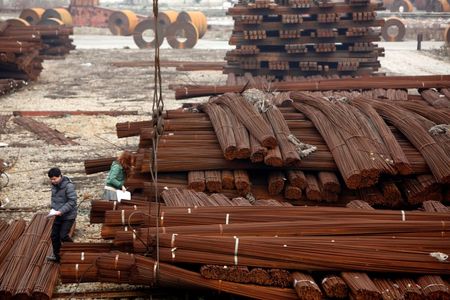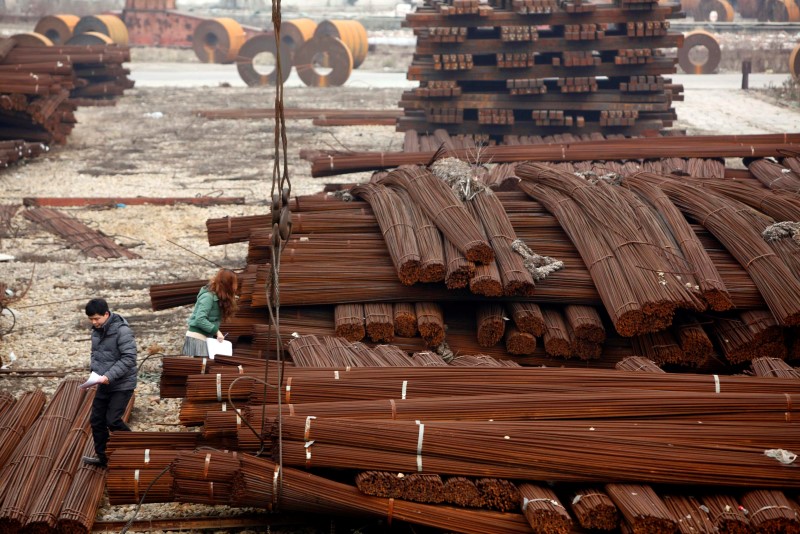By David Stanway
BEIJING (Reuters) - Chinese steel mills, among the biggest in the world, are altering their production schedules to offset disruption from forced plant closures aimed at curbing choking air pollution during a summit of world leaders in Beijing next month.
The move shows how steel mills in the world's top producer and consumer are adapting to the periodic shutdowns enforced by Beijing.
Dozens of steel mills in industrial areas straddling the capital are set to shut from Nov. 1 to cut smog before leaders, including U.S. President Barack Obama, attend the Asia-Pacific Economic Cooperation (APEC) meeting. China had imposed similar shutdowns on industry during the 2008 Beijing Olympics.
With air pollution readings hitting an eight-month high in mid-October, the government is aiming to clear the skies and avoid another embarrassment after the city's marathon this month, where many participants ran with gas masks. Forecasters have warned of the smog worsening this week.
Beijing is focusing its efforts on Hebei province, which, with an annual production capacity of 286 million tonnes, produces more steel a year than the whole of the European Union and was home to seven of China's 10 most polluted cities in the first nine months of 2014, according to official data.
But steel mills, already suffering from a capacity glut, slowing demand and weak prices, aim to minimise output disruptions, industry sources say.
Credit Suisse said in a note that the ability of steel mills to shift production to October and late November should moderate fluctuations in monthly output, though it estimated national industrial growth for November could be cut by 0.2-0.4 percentage point from the APEC meeting-related shutdowns.
Mills have also ramped up the most polluting pre-treatment process in steelmaking, called sintering, ahead of the closures. Sintering facilities, which produce sinter for the blast furnace from iron ore fines, are the ones that have been mostly lined up to shut in November, said an iron ore trader in Shanghai.
"Some mills in Tangshan who were going to shut their sinter plants in November had been trying to produce more sinter ore before the end of October so they would have enough material by next month," the trader said.
Producers and traders surveyed by Reuters also said any decline in production in Hebei was expected to be offset by increases elsewhere, as mills fight for market share.
Already, production in Hebei has fallen 2.9 percent in the first nine months of 2014 but has been offset by a 9.3 percent increase in Jiangsu province near Shanghai.
"We can all predict what will happen - people in Hebei will produce less and people in other provinces like Jiangsu will produce more," said Xu Zhongbo, chief executive of Beijing Metal Consulting, who works closely with Hebei steel mills.
NATIONAL IMAGE PROBLEM
Hebei Governor Zhang Qingwei said in September that Hebei would step up efforts to curb pollution from sectors like steel, glassmaking and thermal power, adding that reducing smog during the APEC session was vital to protect China's "national image".
According to policies drawn up by the local government, 881 industrial sites in key "pollution control areas" will be suspended by Oct. 31, while another 1,564 sites will have to stop operations in the event of heavy smog.
All steel production within a 100-km (62-mile) radius of Beijing is likely to be suspended, while substandard facilities within 200 km of the capital - which would cover the major steel producing city of Tangshan - will also be closed.
Traders have been looking for any prospect of recovery in the depressed steel sector and had expressed hope that compulsory closures during APEC could give prices a boost.
When reports first emerged on Oct. 13 that capacity in Hebei might be affected, Shanghai rebar futures
But the gains have been whittled away, with analysts saying it would take more than temporary closures to resolve the longstanding problems in the sector.
The precise impact of the measures will depend on how Beijing's air quality holds up, with other regions beyond the 200-km radius - including the big steel producing city of Handan - also facing suspension if Beijing's smog readings soar.
"There is some flexibility and the specific amount of capacity to be restricted is still unknown," said a manager with a large steel producing firm in Tangshan.
Any impact on prices could be determined by whether crude steel producers or downstream processors are the ones who suffer most.
"If the restrictions hit the upstream more than the downstream, then the prices of steel may rise, but if the opposite happens, prices
By David Stanway
BEIJING (Reuters) - Chinese steel mills, among the biggest in the world, are altering their production schedules to offset disruption from forced plant closures aimed at curbing choking air pollution during a summit of world leaders in Beijing next month.
The move shows how steel mills in the world's top producer and consumer are adapting to the periodic shutdowns enforced by Beijing.
Dozens of steel mills in industrial areas straddling the capital are set to shut from Nov. 1 to cut smog before leaders, including U.S. President Barack Obama, attend the Asia-Pacific Economic Cooperation (APEC) meeting. China had imposed similar shutdowns on industry during the 2008 Beijing Olympics.
With air pollution readings hitting an eight-month high in mid-October, the government is aiming to clear the skies and avoid another embarrassment after the city's marathon this month, where many participants ran with gas masks. Forecasters have warned of the smog worsening this week.
Beijing is focusing its efforts on Hebei province, which, with an annual production capacity of 286 million tonnes, produces more steel a year than the whole of the European Union and was home to seven of China's 10 most polluted cities in the first nine months of 2014, according to official data.
But steel mills, already suffering from a capacity glut, slowing demand and weak prices, aim to minimise output disruptions, industry sources say.
Credit Suisse said in a note that the ability of steel mills to shift production to October and late November should moderate fluctuations in monthly output, though it estimated national industrial growth for November could be cut by 0.2-0.4 percentage point from the APEC meeting-related shutdowns.
Mills have also ramped up the most polluting pre-treatment process in steelmaking, called sintering, ahead of the closures. Sintering facilities, which produce sinter for the blast furnace from iron ore fines, are the ones that have been mostly lined up to shut in November, said an iron ore trader in Shanghai.
"Some mills in Tangshan who were going to shut their sinter plants in November had been trying to produce more sinter ore before the end of October so they would have enough material by next month," the trader said.
Producers and traders surveyed by Reuters also said any decline in production in Hebei was expected to be offset by increases elsewhere, as mills fight for market share.
Already, production in Hebei has fallen 2.9 percent in the first nine months of 2014 but has been offset by a 9.3 percent increase in Jiangsu province near Shanghai.
"We can all predict what will happen - people in Hebei will produce less and people in other provinces like Jiangsu will produce more," said Xu Zhongbo, chief executive of Beijing Metal Consulting, who works closely with Hebei steel mills.
NATIONAL IMAGE PROBLEM
Hebei Governor Zhang Qingwei said in September that Hebei would step up efforts to curb pollution from sectors like steel, glassmaking and thermal power, adding that reducing smog during the APEC session was vital to protect China's "national image".
According to policies drawn up by the local government, 881 industrial sites in key "pollution control areas" will be suspended by Oct. 31, while another 1,564 sites will have to stop operations in the event of heavy smog.
All steel production within a 100-km (62-mile) radius of Beijing is likely to be suspended, while substandard facilities within 200 km of the capital - which would cover the major steel producing city of Tangshan - will also be closed.
Traders have been looking for any prospect of recovery in the depressed steel sector and had expressed hope that compulsory closures during APEC could give prices a boost.
When reports first emerged on Oct. 13 that capacity in Hebei might be affected, Shanghai rebar futures
But the gains have been whittled away, with analysts saying it would take more than temporary closures to resolve the longstanding problems in the sector.
The precise impact of the measures will depend on how Beijing's air quality holds up, with other regions beyond the 200-km radius - including the big steel producing city of Handan - also facing suspension if Beijing's smog readings soar.
"There is some flexibility and the specific amount of capacity to be restricted is still unknown," said a manager with a large steel producing firm in Tangshan.
Any impact on prices could be determined by whether crude steel producers or downstream processors are the ones who suffer most.
"If the restrictions hit the upstream more than the downstream, then the prices of steel may rise, but if the opposite happens, prices may fall," said another official with a Tangshan-based producer.
There are also questions over the effectiveness of action.

"This emergency plan they have announced is quite stringent and will cause disruptions, but we shouldn't expect it to be very effective or for the pollution problems to be solved instantly," said Tao Wang, environmental expert at the Carnegie-Tsinghua Center for Global Policy.
(Additional reporting by Manolo Serapio Jr. in SINGAPORE and Beijing Newsroom; Editing by Muralikumar Anantharaman and Ed Davies)
